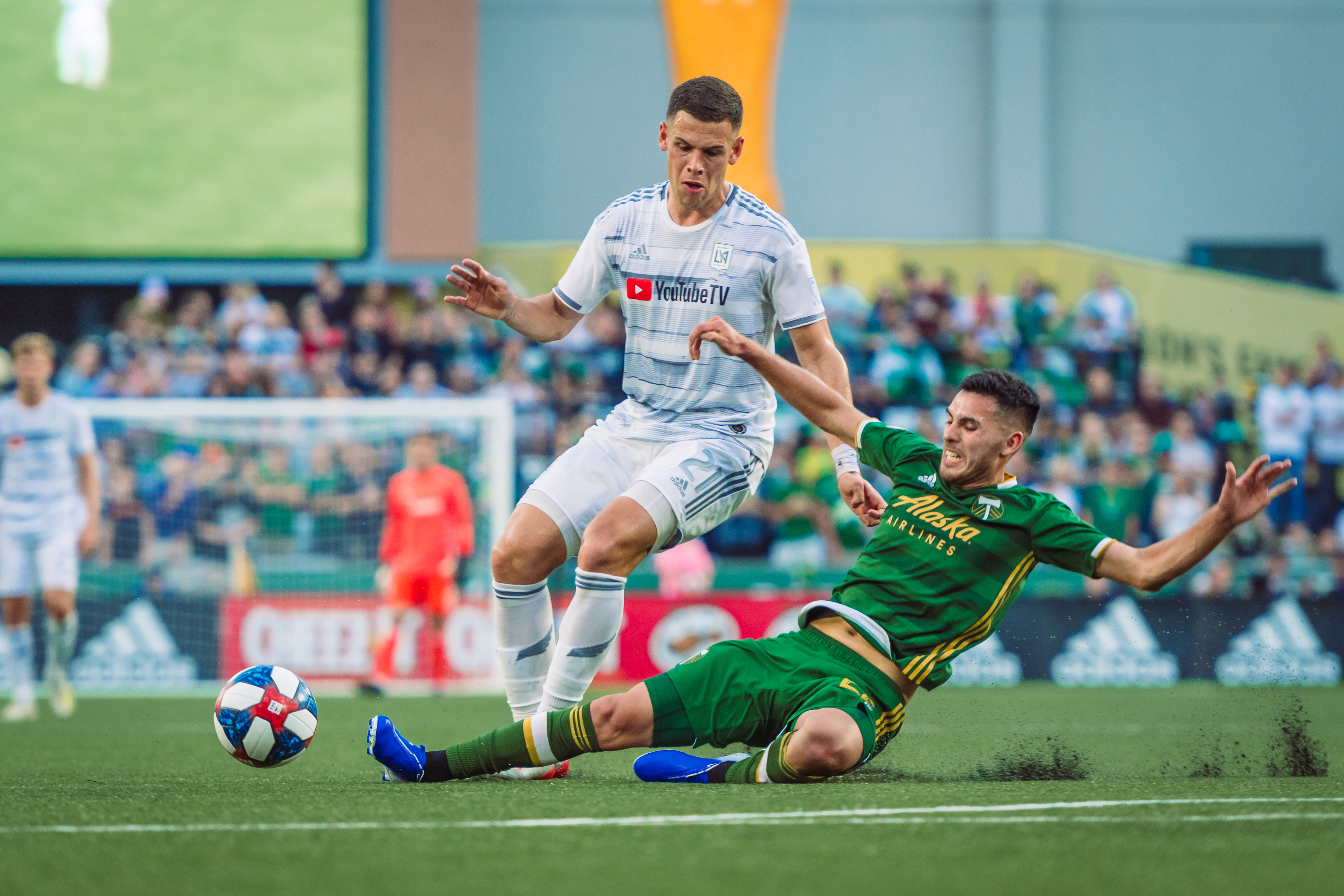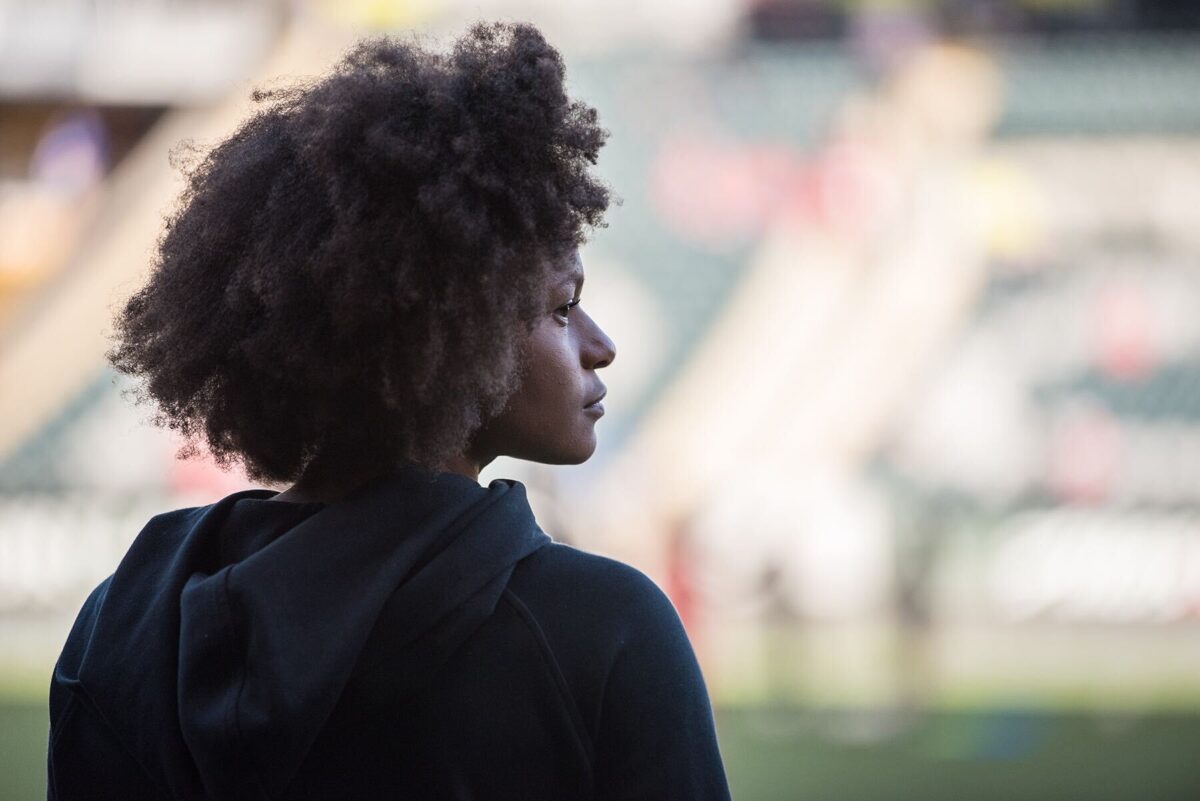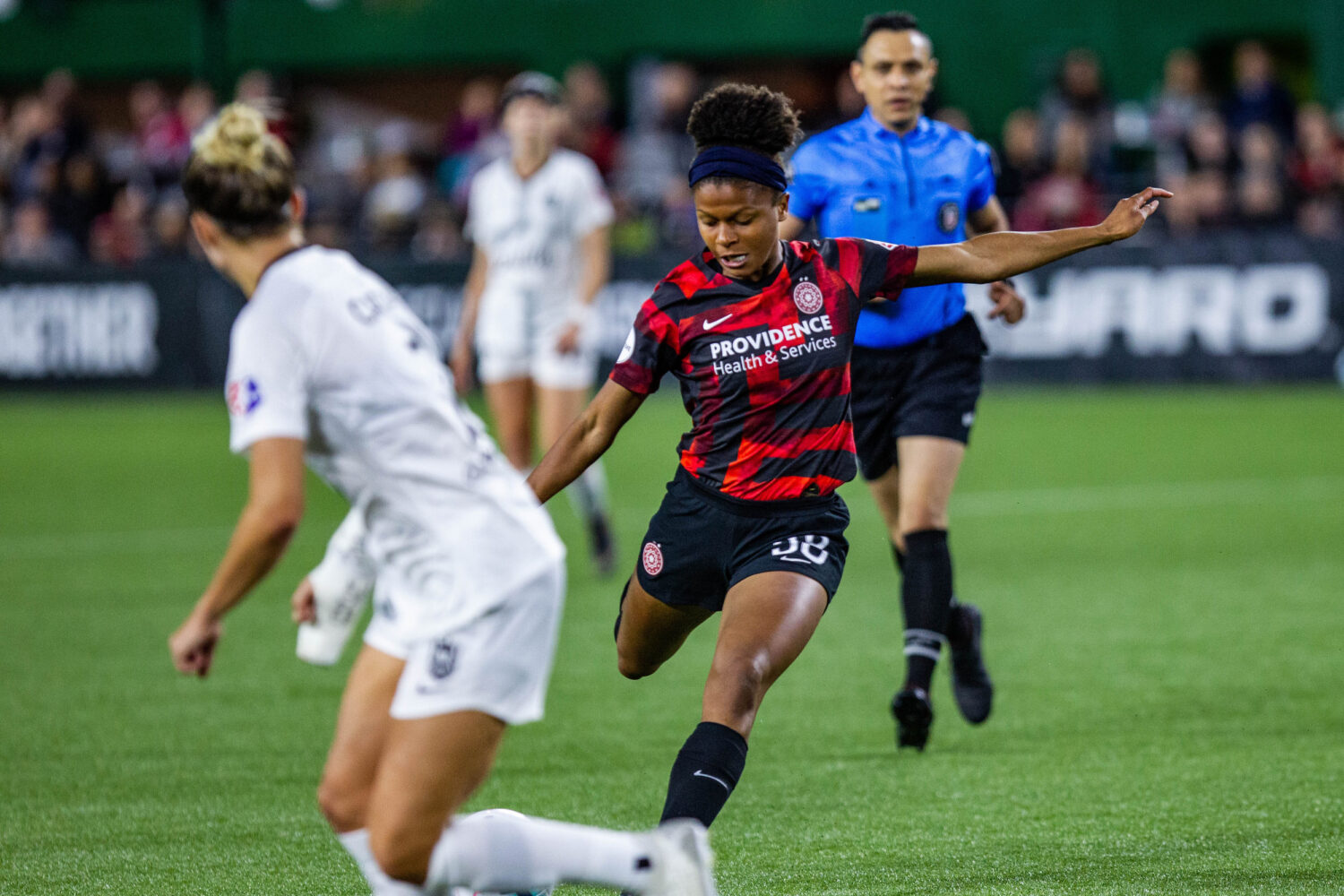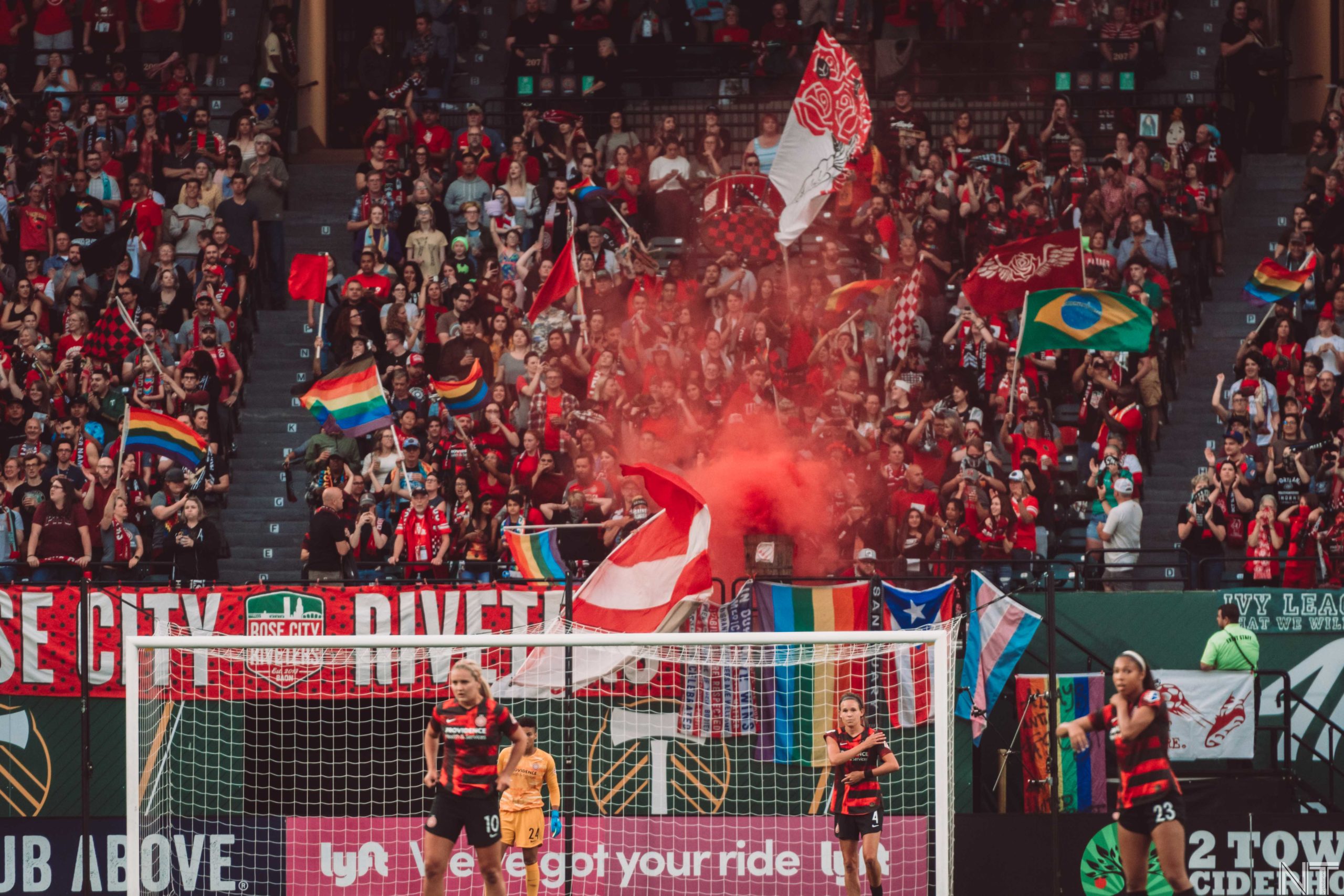To view this content, you must be a member of the Rose City Review Patreon at $1 or more
Already a qualifying Patreon member? Refresh to access this content.


In the wake of the current protest movement around racism and police brutality, I spoke with Thorns forward Simone Charley about her experiences over the last few weeks and beyond. Our conversation has been lightly edited for clarity.
You posted some of your thoughts a couple weeks ago on social media. One thing you wrote was something along the lines of “are you actually ready to do this—are you prepared to feel uncomfortable?”
Yeah. Um. I think just for me especially when I was writing that, and just talking about it, thinking about it, it was just challenging, just because I feel like at least for me that was the first time that I’ve kind of seen everything go full cycle in my lifetime. Like I remember when Black Lives Matter started after Trayvon Martin was killed and you know it gained steam and “popularity,” and all of that, and then it died off. And we’ve seen it happen, police brutality and systemic racism in general, just continue. And so now I feel like it’s the first time I’m seeing the second wave and I feel like I just got some serious déjà vu, which I think is why I’ve been reluctant to be excited and like, happy about it. I think when we talk about racism and stuff, kind of like I put in the post, we’re talking about being uncomfortable. I think it’s a lot of confronting racism within yourself, and I think that can be challenging for people, especially, a lot of times I feel like we think of racism as like, there’s “a racist” and “a not-racist.” I feel like racism is more of a spectrum—how racist are you?—as opposed to whether or not it’s a good apple or a bad apple, and I feel like that’s uncomfortable for people, because racism isn’t limited to being in the KKK. It can be just a simple microaggression on a day-to-day basis.
You also wrote, “faking it or half-trying hurts more than it helps.” Could you talk about that?
Yeah. I think just kind of similar to what I was saying earlier as far as seeing it come full cycle. It’s like, I feel like it almost seemed trendy to post on social media, whether it was Blackout Tuesday, or anything Black Lives Matter. And I feel like that can hurt the movement, because then when you have a whole bunch of people pretending to care, then it can convince people that “oh, you see everyone cares, and everyone’s trying to not be racist,” and think that “oh, see, obviously things are changing, and we’re all on the same page!” when in actuality, that might not be the case. And so, I think that’s why I was saying, don’t fake it if you’re not actually there and you’re not willing to do the work. Because if you’re not willing to do the work, then nothing’s going to change and we’re going to be here again like we are this time and [were] the last time, in the first movement. Or first wave of the movement happened.
What has it been like for you over the past two weeks to continue going to training and worry about soccer and fight for a roster spot?
Definitely been challenging, I would say. I think when everything first happened, that was a hard couple of days for me, just grappling with that. I think seeing the huge contrast between—I feel like the contrast was just very apparent between my life and my teammates’ lives, just because, you know, something like that happens and that impacts me. That impacts my family. I think of my brother; I think of my dad. I think of the cycle I was talking about, and I was just very sad. Whereas I think for a lot of my teammates, obviously it’s sad for them, but it doesn’t affect them the same way. So their lives can just continue. And I think that contrast was very apparent in the beginning. But I would say I’m very proud of my team and how we’ve kind of addressed it now, where we’ve been having the hard conversations about race, and our team and staff are like, listening to podcasts, and having weekly discussions about it, and someone started a book club, and we’re reading So You Want to Talk about Race? And like, willing to have those discussions. So I would definitely say it’s been somewhat of a rollercoaster, where it started off where I just felt very isolated, but I feel like now our team has been doing an amazing job of taking steps towards confronting racism within themselves as well as within the community.

Who started those conversations—not naming names, necessarily, but is that something you or your other teammates of color started, or is that was that something your white teammates started?
Yeah, kind of a group of teammates. An intermix, a group of both Black and white teammates did, and kind of like addressed it as a team a few days after everything went down. Which I think that was very important, that it wasn’t just a Black person saying something, but it was Black and white. And then also our staff—staff members reached out shortly after that conversation to just see, okay, what can we do to further support you. So, kind of a group of people.
I don’t know if you saw what Jeremy Ebobisse wrote a week or two ago—
Yeah!
He talked about this whiplash feeling, where he’s been wanting to talk about these issues with his teammates, with people in his life, and has not been able to do that for so many years, and now all of a sudden it’s like, “oh, now you want to talk about this…” I’m wondering if you share that experience.
Oh, 100%. It’s very interesting. I think just—it’s interesting because I feel like people are open in a way that they haven’t been before, which I think has been interesting—I don’t know how else to word that. I think of like, I’ve had teammates who—one of my teammates from college who reached out to me wanting to discuss race and things like that. And it was just very challenging for her, just confronting it, and it was interesting because in college, me and her had had many conversations about race, but she admitted to me on the phone she just didn’t really believe me, and it just didn’t seem real to her, but like, now it does. And it’s like, it’s a interesting feeling. Obviously I appreciate your willingness to like, understand and be more open, but at the same time it’s like, I’ve been saying this, you know? So it’s interesting.
Soccer in America is a really white sport—I want to ask you in a broad sense what your experiences were like growing up in that system.
Yeah. Um. I think that’s kind of hard to unpack. I just think that growing up, I was always one of the only Black people on the soccer team, and I feel like it’s something, as you get older you notice it more, but I feel like it’s just something I got used to, and it’s just what it was. And so—yeah. I feel like—is there anything in particular you want me to talk about in that experience?
Well, I guess in part, expanding on the last question about being able to talk about race with your teammates—which, I can’t imagine how much harder that would have been as a young person.
I would say, I feel like at least for me, I would want to talk about race, especially growing up when things would happen. Not when I was very young, because I think you don’t really know what’s going on. But I think of, once you get in like, high school, something happens and you’re like, “hmm. I don’t know how I feel about that. But I wouldn’t really talk about race like that, because being one of the only Black people on your team, you don’t want to like, draw attention to your—what am I trying to say? Yeah, I don’t know. I just feel like it was something I didn’t want to bring up. I would just internalize it and I wouldn’t, I would just feel like people wouldn’t understand, so why bring it up? So I just wouldn’t. Because that’s how it always was, it was just the new normal at one point, and it’s only recently that it’s like, wait, that shouldn’t be normal, and that shouldn’t be okay, and we should be able to speak about these things.

Portland, also, as we know, is a very white city, and you moved here on your own a couple years ago—
[Laughs] Yeah.
Has the whiteness of this city been challenging for you?
Yeah. It’s definitely interesting. I think when I first moved here, I remember just like, joking with my parents, being like, “there’s really no Black people here? This is crazy!” You can walk down the street, go a whole day, and not see a Black person! Which is like, definitely an adjustment, I would say. Which I also think is super interesting too, because I feel like Portland prides itself on being inclusive and all that, which is awesome, you see like, signs in stores that say, “oh, we accept all religions and sexualities and races,” all of that. But it’s just, I mean it’s just funny, because it’s like, super inclusive, but there’s also not the diversity there to necessarily be inclusive? That’s just a funny thing. But I do think it was challenging for me in the beginning. I think when you don’t see people who look like you and have the same experience as you, especially when it comes to making friends and stuff, I think obviously I appreciate and value my friendships I have with my white friends, but at the same time, I do appreciate having Black friends, because there’s a level of understanding of like, my experience, that my friends that are Black can understand that my white friends don’t understand in the same way. I think that was definitely challenging for me in the beginning.
You broke onto this team in what I have to imagine was a pretty stressful way—by essentially training for free. I don’t want to make assumptions about your socioeconomic situation, but for a person who’s able to have their parents pay for their apartment or something, that situation is a lot easier. There’s an intersection there between class and race—rich white people will find it easier to break into the sport this way than people of color, and people who didn’t grow up with money.
Yeah. I would say I’m blessed and fortunate that my parents were able to help me during that time, but I started working at a gym that was close by. I was living with a host family. Yeah, I was working at a gym and training people on the side and stuff like that, and then in the offseason I was doing a whole bunch of odd jobs—Postmates, I was delivering food, stuff like that. But yeah, I would say I’m blessed in that my parents were able to help me during that time, but I know that that’s definitely not the case for a lot of people, and if that was the case, I don’t know how much—if I would have been able to be here playing, and been able to make it through a whole year of essentially being unemployed.
If you could tell the white soccer establishment anything about what you think needs to change in this sport, what would that be?
I would say expanding the lens of how to evaluate and review Black athletes. Because I feel like especially, at least in my experience in soccer, I feel like a lot of times Black soccer players are put in a box of, oh, we’re athletic, or we’re fast, or powerful, tenacious—things like that. As opposed to, “you’re a very technical player,” or “you have a high soccer IQ.” Things like that. I feel like a lot of times, regardless of how technical or smart you may be, a lot of times Black athletes are put in a box of just being athletic, and that’s what they’re applauded for. I think that we need to expand our thinking and ask ourselves, “why are we just saying they’re athletic? Are they technical? Are you a smart player?” Making sure, yeah, that we’re not limiting players and putting players in a box like that.
Has that been your personal experience, getting put in that “athletic, fast” box?
I think that’s been something I’ve experienced. I think I’ve seen that happen to Black teammates, as well, Black teammates I’ve had.
Is there anything you feel like the media needs to do better in covering race issues within the sport?
I would say just having more conversations about it. Obviously it’s very important as far as like, talking about gender equality and stuff, that’s a huge deal, and pay equity, all of that is super important. I also think race conversations should happen more often as well, because that’s also a very real reality for a lot of players. So I would say it’s more just continuing the conversation, continuing to have conversations like this, so that we can highlight the different experiences that players have, and even talk like, what I was saying earlier about having players be put in a box. I think we can highlight that and people know that. Just being more aware, I think is a thing that could make a big difference.

The Portland Timbers and Thorns are getting closer to playing real soccer games, and you have questions.
First off—and most importantly—as we’ve echoed through writing, Twitter, and The Rosette, soccer is just a game. Now is the time to be paying attention and educating yourself on this vital moment in our country’s history.
However, soccer does still exist, and as the weeks go by, we are inching closer to the return of the sport in North America. The NWSL Challenge Cup will kick things off in late June, followed by the resumption of Major League Soccer in July.
In this week’s Q&A feature, we answered questions ranging from our thoughts on the restart to our all-time favorite PTFC post. This article highlights some of the questions that were asked. If you are interested, the complete conversation can be found in our Discord, available to Patreon subscribers at the $5 and $10 levels. Subscribing also gives you the opportunity to participate in future Q&As. Without further ado, let’s get to it!
Some questions and answers have been edited for clarity.
Hi everyone,
As the possibility of actual soccer being played looms on the horizon, we are once again making regular soccer content. There’s been some (understandable) confusion over the last few months as we got up and running, and then put a pause on things due to the pandemic. We’ve ironed some technical issues out and discussed our Patreon tiers. The long and short of it is:
Thanks for sticking with us through this challenging time. Your donations allow us to pay all our contributors, including photographers, and this month, they meant we were able to make a donation to Don’t Shoot Portland.